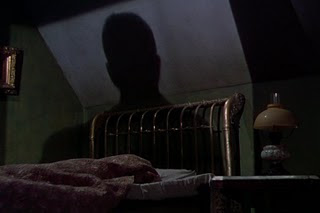
The Maltese Falcon: (1941. dir: John Huston) The thing about this film --other than the extraordinary fact that this masterpiece of nastiness marks Huston's debut in the director's chair-- is the claustrophobia of it. Much of it plays out in crowded little rooms: Spade's seedy office, Gutman's rich, overstuffed living room where Spade gets slipped the old mickey, and then everyone squeezes for the night into Spade's coldwater flat to await the delivery of the rara avis and to strip metaphorical pieces of flesh off one another. Huston's camera angles add greatly to the air of suffocation and vileness. Rarely do we look straight across at someone: it's up or down, giving a sinister feel of distortion, and groups of threes tend to be cramped together and hunched over, like caged beasts.
As a kid I disliked the film because of Mary Astor, who seemed to me about as fatale as the overworked waitress down at the corner bakery. She gets announced in the first breath of the film as "a knockout", but instead this pinched, nearsighted woman with hair simultaneously mousy and insane walks in and proceeds to hyperventilate and overemote for two hours. In retrospect, I can see that the character herself never once relaxes, never stops acting; that we never do see a moment that we're certain is the real girl beneath the masks. I'm willing to concede that it may be quite a feat, and I may owe Astor an apology; I'll get back to you when I'm certain.
Bond is Detective Tom Polhaus, the benevolent half of the Good Cop/Bad Cop plaguing Spade, and he gets photographed mostly from the side or back so we watch Bogart instead, but I'm fond of this character. I love the low-key delivery, the solidity of this man amid the jackal-pack of crooks and half-crooks, a decent man in a place where no one ever says exactly what they mean unless they know it will hurt someone. I love the optimism of him, as when he says of the dead Archer, "It's tough him gettin' it like that, ain't it? Miles had his faults like any of the rest of us, but I guess he must have had some good points, too, huh?" To which Spade can only grimace, hesitate, and reply, "I guess so," in a tone that really says, "No, and I knew him as well as anyone did."

Hitler -- Dead or Alive: (1943. dir: Nick Grinde) Whoa! Buckle up for a wacky, hamfisted little war-time film about gangsters fresh from Alcatraz who hijack a plane into Germany to assassinate the little guy with the moustache for a million dollar reward. A lot less fun than Inglourious Basterds while every bit as bughouse-unbelievable in its plot-turns, it does boast a more satisfying means of offing the Fuehrer, but very little else. Bond is the head gangster and gives a strangely over-the-top performance, like he's imitating a Cagney mobster, missing what's good about it and just skimming the cheese off the top. He's got a few satisfying scenes, like teaching the newbie prison etiquette or (my favorite) the time the Countess turns on the ice when she hears he's just doing it for money and he comes back with, "Is it a crime for a guy to make a couple of quarters?"

Dakota: (1945. dir: Joseph Kane) Walter Brennan has one funny moment in this decidedly unfunny comedy/action oater. He's trying to deny that two people have been murdered: "Maybe it's one of them suicide pacts where one person says to the other, 'Hold on a minute while I blow your head off.'" Doesn't really look funny on the page, but he makes it so, and that's about it for the humour. John Wayne and Vera Ralston are nobody's George and Gracie, and in fact the script plods every time Ralston walks onscreen. It's hard to say who's more annoying: Vera herself or her character, a ditzy blond who brings trouble with every decision she makes. I suppose she was supposed to be in the tradition of Katharine Hepburn in Bringing Up Baby, but the two names shouldn't be spoken in the same sentence. Ward Bond is entirely in his element as a smooth land-grabber out to cheat everyone in Fargo, but we never get to see him fight the Duke, always a disappointment for me.

Blowing Wild: (1953. dir: Hugo Fregonese) Love triangle amongst oilmen in Central America. Hard to miss when your triangle consists of Stanwyck, Cooper and Quinn, but this one comes pretty close. The directing feels shabby and loose, and there's no palpable chemistry between the supposedly mutually-obsessed Stanwyck and Cooper. The heat comes from Anthony Quinn on the odd-man-out point of the triangle; he throws himself full-force into the passion as a hot-blooded man in love with his wife and unable to punish his best friend or to live with the truth of it. Stanwyck is a goddess and can play this role hogtied and blindfolded, and she does, she plays it into the ground, but I'm tired of seeing her stuck in this same dead-end role of the woman who's too strong to live. Bond is Cooper's sidekick again, this time kind of a thick and hangdog one, who disappears into the hospital after a half hour and so gives the Cooper character his excuse to stick around town long after he says he wants to leave.


















